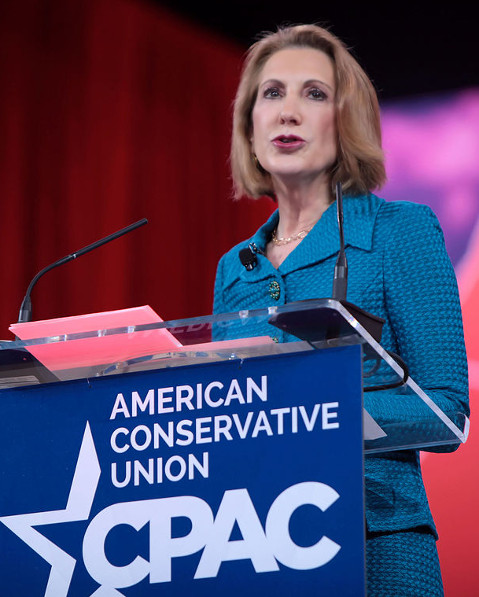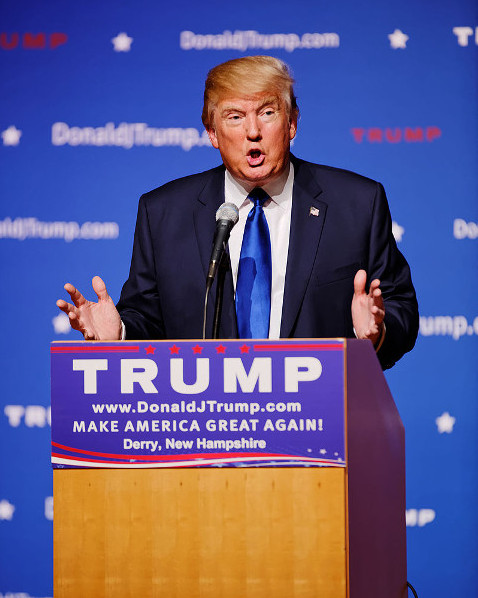Campaigns Make Women Candidates Face It
Appearance Less a Talking Point the More Women Compete for Office
Republican presidential candidate Donald Trump raised eyebrows last month when he ridiculed opponent Carly Fiorina’s appearance. Quoted in a Rolling Stone cover story as saying, “Look at that face,” while watching Fiorina on Fox News, “Would anyone vote for that?” Trump later told CNN that he had been referring to his opponent’s “persona” with the remarks, not her looks.

Later that month, the two candidates faced off during the CNN Republican presidential debate. In a highly anticipated moment, Fiorina calmly reacted to her rival’s comments in Rolling Stone, saying that despite his backpedaling, she believed “women all over this country heard very clearly” what Trump had actually meant by the personal jabs.
In a 2012 piece responding to the Drudge Report lambasting then-Secretary of State Hillary Clinton’s makeup-free face, journalist Erin Gloria Ryan wrote:
“You may not agree with a woman, but to criticize her appearance — as opposed to her ideas or actions — isn’t doing anyone any favors, least of all you. Insulting a woman’s looks when they have nothing to do with the issue at hand implies a lack of comprehension on your part, an inability to engage in high-level thinking. You may think she’s ugly, but everyone else thinks you’re an idiot.”
And yet, as these kinds of attacks remain the standard, women need to be aware of how closely tied their appearance is to perceptions of their performance. Princeton research informs us that a first impression can be formed in less than a tenth of a second, which is when we determine two key traits: likeability and competence. So it’s no surprise that results of another research study showed that two-thirds of 2,000 women surveyed feel twice as much pressure as men do when it comes to their appearance, knowing that their merit is being measured within those first glances at their faces. The double-bind position is that women also have to play down their likeability in order to convince audiences that they are tough enough to make the complex decisions required of leaders. They must communicate their competence without being seen as bragging or displaying self-aggrandizement because both behaviors conflict with society’s sex-role expectations for women.

In her 1978 essay “The Double Standard of Aging,” writer and cultural critic Susan Sontag wrote about the existence of a double standard in appearance, stemming from the fact that women’s faces are valorized for only one thing: girlish beauty. Men’s faces, on the other hand, are notable for being interesting, weird, wizened, humorous, and so on. This holds true in today’s political arena. Much has been said about Donald Trump’s infamously comical hair, for instance, but has anybody gone so far as to infer that he would be a less than capable candidate or president due to his comb-over? On the other hand, when taken at face value, Trump’s comments about Carly Fiorina’s face imply that he believes she simply isn’t pretty enough to be President.
At this moment, Fiorina player the gender card “It’s still different for women,” Fiorina told CNN after her debate standoff with Trump. “It’s only a woman whose appearance would be talked about while running for president — never a man. And that’s what women understand.”
But does Carly Fiorina speak for all women on all issues? Because viewers of the debate were wowed by the poise with which she handled Trump’s disparaging remarks, they might have set aside the fact that Fiorina’s campaign platform isn’t at all sympathetic to women’s issues. When I decide if a candidate is attractive, I consider her (or his) position on the issues so keep this in mind: Fiorina opposes the Equal Rights Amendment, paid maternity leave, reproductive choice, and equal pay legislation — and she is against putting a woman’s face on the $10 bill. While Fiorina’s own face has been highlighted as a point of contention by her main campaign competitor, the public has been distracted from assessing her candidacy based on her actual positions on a wide range of issues.
Whether a woman is considered conventionally attractive or being ridiculed in the ways that Fiorina and Clinton have been, a candidate’s appearance becomes headline news, overshadowing a rational fact-based discussion about her experience, intellect, and her ideology.
This is especially true where an election cycle presents only one or two women candidates among many more men. The more women we have competing for office, the less likely it is that a female candidate’s appearance will be the predominant talking point throughout her campaign.
But for now, the sad truth remains that if you are a woman who seeks a top leadership position, you should be prepared for comments — if not criticisms — regarding your appearance. If you have confidence in your capacity to lead, take the high road to the podium. That’s where you’ll convince decision-makers and voters that whatever comes your way, you can face it.
Lois Phillips, PhD, is a communications consultant who provides coaching and speechwriting services to executives. This was adapted from loisphillips.com/blog-articles/.



